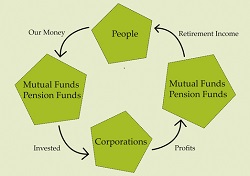|
People, Profits, & Pensions |
|
Oregon Public Employees & Corrections Corporation of America
Thursday, February 13, 2014
When Corrections Corporation of America (symbol CXW) announced its fourth quarter and full year 2013 results yesterday, Oregon's public employees were among those with a stake in the news. The Oregon Public Employees’ Retirement Fund owned 24,654 shares of Corrections Corporation, at the close of trading on September 30, 2013, according to nasdaq.com data. The company is the USA's largest private prison provider, and describes itself this way in its earnings news release:
Last year, Corrections Corporation converted itself into a publicly traded real estate investment trust (REIT). The Bigger Picture:Will Profits from Big Macs Add to Your Retirement Income?In 1948, the McDonald brothers redesigned and remodelled their drive-in restaurant in San Bernardino, California. Taking inspiration from Henry Ford's assembly-line, they created the fast food revolution, with the quick service and low prices we now take for granted. In that same year, the U.S. National Labor Relations Board ruled unions could include pension issues in contract negotiations. That ignited a massive expansion of pension plans. In the 1950s, pension funds started buying stocks, rather than just bonds or their equivalents; in addition mutual funds came of age. With these two developments working, middle class people became owners of big business. At first, their stakes were modest, but steadily growing. And in just a few decades, they gained controlling interests in many large corporations through their funds. Management guru Peter Drucker has called it, "...one of the most startling power shifts in economic history." Now, working people reap the benefits of those investments, collecting much of the profit distributed by McDonald's and other big corporations. Discover how the pieces fit together. In Big Macs & Our Pensions: Who Gets McDonald's Profits? - a new booklet -(about 25-pages), you will:
You may not be among the owners of McDonald's. But if you belong to any pension plan, or contribute to a mutual fund or whole life insurance policy, you likely own pieces of some big corporations. More importantly, though, your retirement income will be bigger and grow more dependably than you would otherwise expect. Big Macs & Our Pensions: Who Gets McDonald's Profits? is now available at Amazon.com
|

The Ownership Cycle
Copyright 2014. Robert F. Abbott, All Rights
Reserved.
|

 By: Robert F. Abbott, author of
By: Robert F. Abbott, author of